
The Digital Transformation: Advanced Data Science course covers digital transformation and data science technologies, practices and strategies and is further advanced by detailed explorations of AI and machine learning analysis and analytics techniques and algorithms, as well as big data processing and storage platforms. Topics include AI neural networks and data processing mechanisms.
Complete the Digital Transformation: Advanced Data Science course and, optionally, get accredited as a Certified Digital Transformation Data Scientist by passing the certification exam. You can purchase the course now and get the exam later, or you can get them together at a discount as part of the Certification Bundle.
Upon completing the course you will receive a digital certificate of completion, as well as a digital training badge from Acclaim/Credly. Because this course encompasses multiple certifications, upon passing the exam you will also receive official Digital Transformation Specialist, Digital Transformation Data Science Professional and Digital Transformation Data Scientist digital accreditation certificates and certification badges from Acclaim/Credly, along with an account that can be used to verify your certification status.
If you already completed Modules 1, 2, 9, 10 and 11 in this certification track, you can purchase a partial course (or a partial bundle) with only the modules specific to the Digital Transformation Data Scientist track here.
The Digital Transformation: Advanced Data Science course is comprised of the course modules listed below, each of which has an estimated completion time of 10 hours. Modules 10.A, 10.B, 13.A and 13.B are provided to you, but you are only required to complete one of 10.A or 10.B and one of 13.A or 13.B to complete this course.
Choose the Certification Bundle to receive the entire course together with the online-proctored certification exam and a set of practice exam questions, all at a bundle discount.
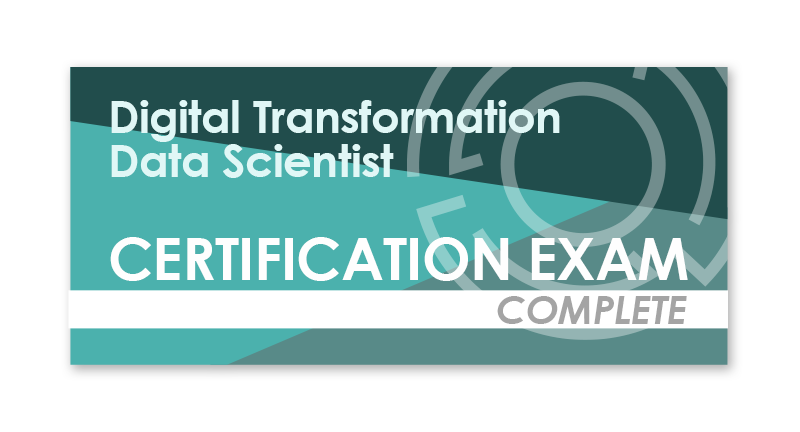
Exam Details

Exam Details
Upon purchasing this course, you will automatically receive access via the Online Interactive eLearning platform. To provide you with the greatest flexibility, you will also have the option to access the course materials via two additional eLearning formats, at no extra cost. All three eLearning formats are briefly described below. A more detailed comparison can be found here.
- For everyday learning: An online interactive eLearning platform with individual lessons, as well as interactive and automatically graded exercises and practice questions.
- For learning on-the-go: A study kit platform with access to full course documents that support online/offline synching, annotations, comments, custom bookmarks and cross-document searches.
- For your reference: A set of printable watermarked PDF documents that you can keep (for all course workbooks and posters).
All three forms of access are subject to Arcitura’s *.
Upon purchase, access to the online interactive eLearning platform (1) is provided within one business day. Access to the study kits (2) and the PDF documents (3) is provided upon request.
The course is comprised of a set of modules. Each module has a set of lessons and is further supplemented with exercises to help reinforce your understanding of key topics. Shown below are the digital contents and the topic outline for each course module:
Module 1: Fundamental Digital Transformation
This course module provides an easy-to-understand introduction to Digital Transformation and how it relates to business, technology, data and people. Coverage includes the benefits, risks and challenges of Digital Transformation, as well as its business and technology drivers.
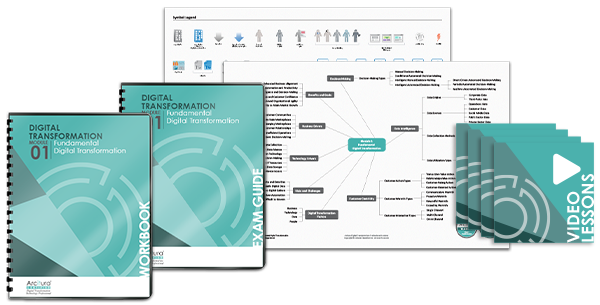
Course Module Contents
Topics Covered
Module 2: Digital Transformation in Practice
This course module delves into Digital Transformation automation environments by exploring the key contemporary technologies used to build Digital Transformation Automation solutions, including AI, RPA, IoT, machine learning, blockchain, cloud computing and big data.
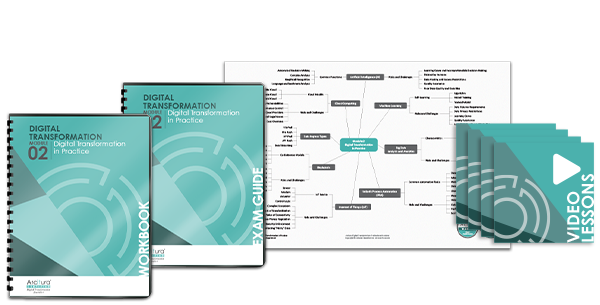
Course Module Contents
Topics Covered
Module 9: Fundamental Big Data Analysis & Analytics
This foundational course module provides an overview of essential big data science topics and explores a range of the most relevant contemporary analysis practices, technologies and tools for big data environments. Topics include common analysis functions and features offered by big data solutions, as well as an exploration of the big data analysis lifecycle.
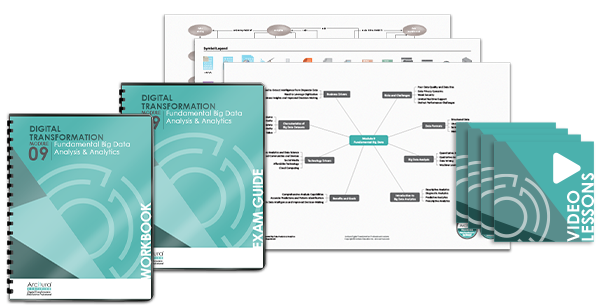
Course Module Contents
Topics Covered
Module 10.A: Fundamental Machine Learning
This course module provides an easy-to-understand overview of machine learning for anyone interested in how it works, what it can and cannot do and how it is commonly utilized in support of business goals. The module covers common algorithm types and further explains how machine learning systems work behind the scenes. The base module materials are accompanied with an informational supplement covering a range of common algorithms and practices.
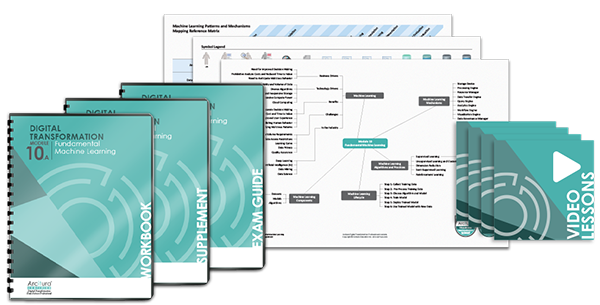
Course Module Contents
Topics Covered
Module 10.B: Fundamental Predictive AI
This course module illustrates how predictive AI can be used and applied in a range of business applications, as well as essential coverage of predictive AI practices and systems. The module explores the most common learning approaches and functional areas that AI systems are used for. All of the content is authored in easy-to-understand, plain English.
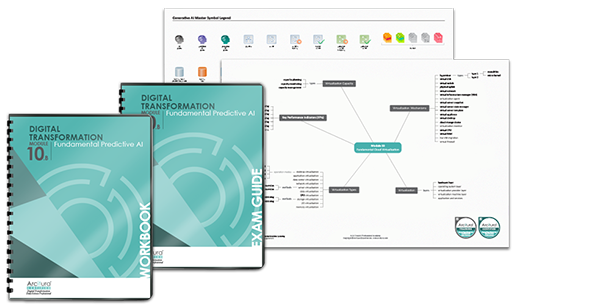
Course Module Contents
Topics Covered
Module 11: Fundamental Generative AI
This course module explores the application of generative AI within a range of business scenarios and provides fundamental coverage of generative AI concepts, models, best practices and neural networks, including Generative Adversarial Networks (GANs), Variational Encoders (VAEs) and Transformer models. All of the content is authored in easy-to-understand, plain English.
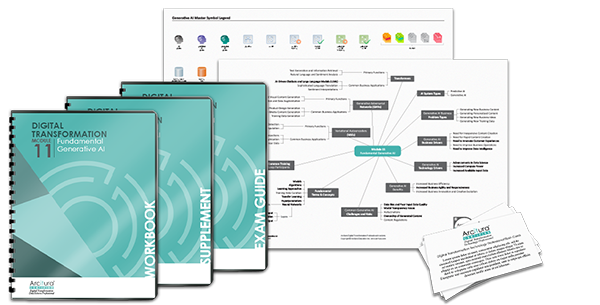
Course Module Contents
Topics Covered
Module 12: Advanced Big Data Analysis & Analytics
This course module provides an in-depth overview of essential and advanced topic areas pertaining to data science and analysis techniques relevant and unique to Big Data with an emphasis on how analysis and analytics need to be carried out individually and collectively in support of the distinct characteristics, requirements and challenges associated with Big Data datasets.
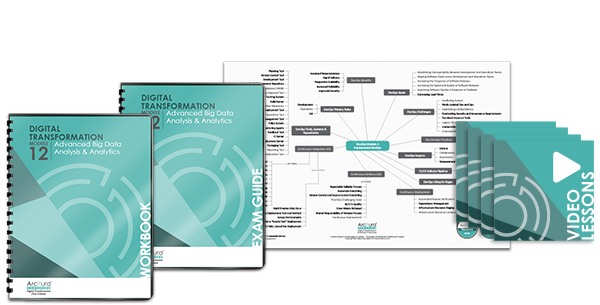
Course Module Contents
Topics Covered
Module 13.A: Advanced Machine Learning
This course module delves into the many algorithms, methods and models of contemporary machine learning practices to explore how a range of different business problems can be solved by utilizing and combining proven machine learning techniques.
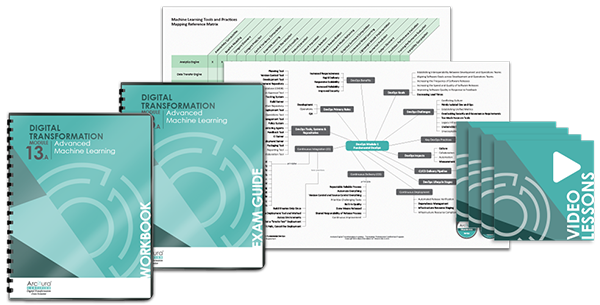
Course Module Contents
Topics Covered
Module 13.B: Advanced Predictive AI
This course module provides insight into how predictive AI systems work by exploring common techniques for learning, data processing and manipulation, and AI system performance management. The course module does not cover any mathematical formulas or programming and is intended for general IT professionals.
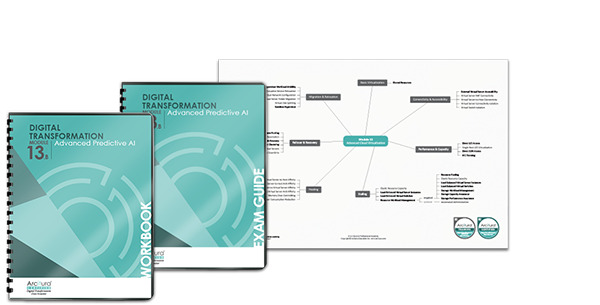
Course Module Contents
Topics Covered
Module 14: Advanced Generative AI
This course module covers a range of common generative AI networks, models and techniques, including specialized neural networks and practices for managing and optimizing generative AI systems and model training processes. The course module does not cover any mathematical formulas or programming and is intended for general IT professionals.
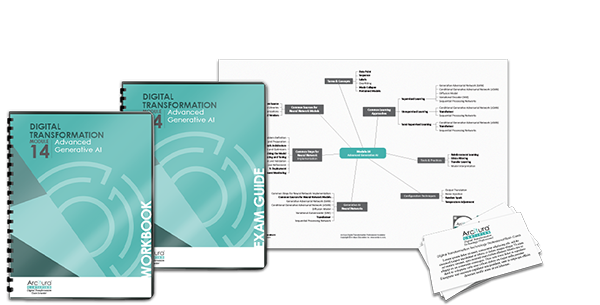
Course Module Contents
Topics Covered
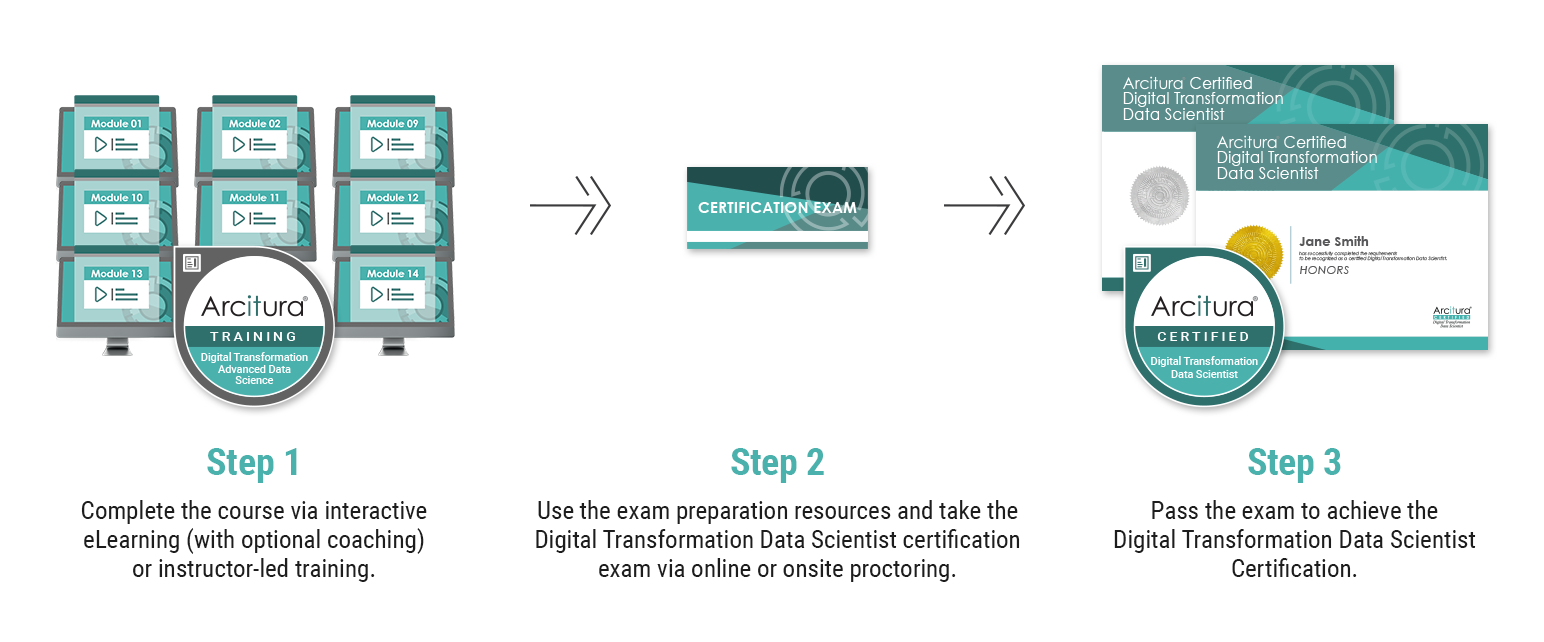
Learn About Arcitura: Take the Video Tour
Watch these helpful informational videos to learn about Arcitura programs, courses and certifications.
About Arcitura
About Arcitura Courses
About Arcitura Certifications
What’s in an Arcitura Course
Comprehensive
Coverage
Each course provides a comprehensive curriculum with 2-3 modules and 20-40 hours of training.
More Than Just
Video Lessons
In addition to standard video lessons, courses include full-color workbooks and reference posters for all
lessons.
Interactive & Graded
Challenges
Courses also include interactive and graded exercises, interactive and graded self-tests and other
supplements.

The Arcitura Difference

EACH COURSE
- is authored by a dedicated courseware development team
- has a self-test, accreditation exam and professional certification
- is available via two different eLearning platforms
ALL COURSES
- undergo a common development process
- are authored to be consistent in quality, structure and style
- share a common vocabulary and symbol notation
- are authored in collaboration with subject matter experts
Take Your Skills Anywhere
Because both courses and accreditations are vendor-neutral, they empower you with skills and credentials that you can take to wherever you need to go.

Lifetime Access Guarantee
Access to the eLearning platforms is dependent on third-party platform providers. As a result, Arcitura cannot make any guarantees or warranties regarding the behavior or availability of the platforms, nor can Arcitura guarantee a specific duration for which these platforms will remain available. When your course is set up on an eLearning platform, your access will have no expiration date and will be provided indefinitely. The PDF documents that can be made available for you to download are yours to keep forever.





